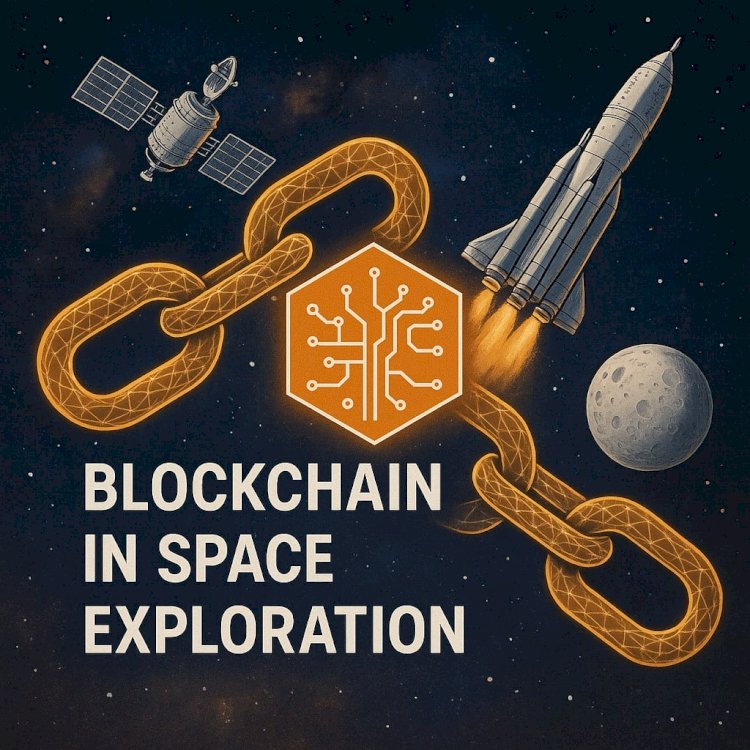The Potential of Blockchain in Space Exploration

By Dr. Pooyan Ghamari, Swiss Economist and Visionary
Space as the Next Economic Frontier
Space has always represented humanity’s ultimate horizon—an arena of discovery, ambition, and limitless possibility. In recent years, however, space exploration has shifted from being the exclusive domain of government agencies to a collaborative ecosystem that includes private corporations, research institutions, and international partnerships.
With this expansion comes the pressing need for robust systems of coordination and trust. In such a setting, blockchain technology—traditionally linked to finance and digital assets—emerges as an enabling infrastructure for the economics and governance of space.
Building Trust Without Borders—or Planets
On Earth, nations rely on contracts, institutions, and intermediaries to ensure cooperation. In space, however, distances are vast, communication is delayed, and centralized oversight is impractical. Blockchain’s decentralized ledger provides a trust mechanism that is borderless, transparent, and tamper-resistant.
Whether it involves sharing scientific data, verifying mission results, or managing multi-stakeholder ventures, blockchain ensures that every participant has access to a secure and verifiable record. This framework minimizes disputes and fosters collaboration in an environment where failure is not an option.
Securing the Flow of Resources
Space exploration is resource-intensive. Every rocket part, satellite component, and supply module passes through complex supply chains involving numerous suppliers across continents. Blockchain can introduce unprecedented traceability and accountability, ensuring that critical materials and parts are authenticated and monitored at every stage.
For future missions—such as asteroid mining or lunar construction—this same technology could manage the ownership, distribution, and exchange of extraterrestrial resources. Immutable ledgers would prevent conflicts over provenance and usage rights.
Smart Contracts for Autonomous Operations
Smart contracts—self-executing agreements stored on blockchains—have the potential to revolutionize how missions are conducted. In the context of space, they could:
-
Automate fuel and energy allocation within spacecraft or colonies.
-
Facilitate agreements for satellite bandwidth or orbital slot sharing.
-
Enable autonomous trade between lunar bases and Earth-based entities.
By reducing dependence on centralized authority, smart contracts can sustain functioning economic systems even in distant environments where Earth-based oversight is delayed.
Data Integrity Across the Cosmos
The further humanity ventures into space, the more vital reliable data becomes. Blockchain can protect against manipulation by providing cryptographic verification of mission logs, telemetry, and scientific findings.
In multi-planetary scenarios, this distributed approach to data management could allow seamless collaboration among teams spread across Earth, the Moon, and Mars—ensuring that all parties operate from the same secure foundation.
Space Governance and Blockchain
As nations and corporations expand their presence beyond Earth, questions of governance will grow more complex. Who has the right to mine resources on an asteroid? How are responsibilities divided on a shared lunar base? Blockchain could provide transparent governance frameworks, recording agreements and ensuring compliance through decentralized consensus.
This approach offers a potential solution to avoid conflicts in outer space, creating structures that balance ambition with fairness.
The Strategic Viewpoint
From an economic perspective, the integration of blockchain into space exploration represents more than just innovation—it is a form of future-proofing. Countries and companies that adopt blockchain early will not only secure their ventures but also shape the emerging space economy to their advantage.
Blockchain may ultimately serve as the backbone of interplanetary commerce, resource management, and governance—making it a strategic tool for both technological leadership and economic sovereignty.
The journey into space is not only a scientific mission but also the birth of a new global economy. Blockchain, with its decentralized and secure structure, offers solutions to some of the most pressing challenges of this new frontier.
By enabling trust, transparency, and collaboration across vast distances, blockchain can ensure that humanity’s expansion into space is not only ambitious but also sustainable and equitable. In many ways, the road to the stars may be paved not just with rockets and satellites—but also with the digital blocks of trust.

 content-team
content-team 


















